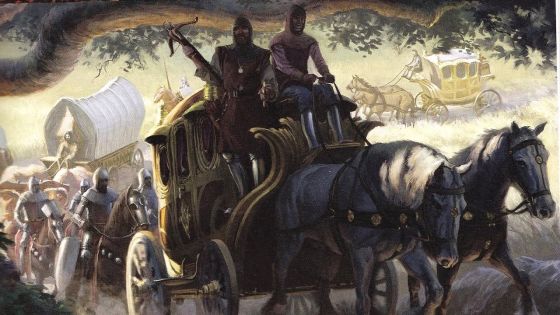Difference between revisions of "Teamstering (sage ability)"
Tao alexis (talk | contribs) |
m |
||
| Line 7: | Line 7: | ||
A teamster has the ability to pack and arrange a load well, to put the least possible strain on a vehicle’s axles, and to greatly minimise shifting or the possibility of goods becoming dislodged. A teamster could, for instance, arrange a wagon to carry stacks of wheat and other light goods as high as 12 ft. above the wagon bed, getting the most from the vehicle’s capacity. These general skills allow the teamster to increase the capacity of a wagon by 10%, and a cart by 15%. | A teamster has the ability to pack and arrange a load well, to put the least possible strain on a vehicle’s axles, and to greatly minimise shifting or the possibility of goods becoming dislodged. A teamster could, for instance, arrange a wagon to carry stacks of wheat and other light goods as high as 12 ft. above the wagon bed, getting the most from the vehicle’s capacity. These general skills allow the teamster to increase the capacity of a wagon by 10%, and a cart by 15%. | ||
| + | |||
| + | [[Category: Sage Abilities]] | ||
Latest revision as of 17:09, 1 January 2023
Teamstering is an amateur-status sage ability in the study of Logistics, that enables a character to drive one or more animals as a team, pulling a cart, wagon, carriage or sleigh. The ability gives no benefit in managing a dog sled team or in handling elephants or some other unlikely beast. Animals that can be managed include horses, mules, Donkeys and oxen.
With 10 knowledge points, the character can manage up to two animals; an additional pair can be added for every 5 pts. of knowledge above 10, so that with 20 pts., the character would be able to manage six animals as a team.
Teamsters are sometimes called "carters." Those who manage oxen are commonly described as "bushwackers." Teamsters gather together at carter posts, where items for shipment are temporarily stored until they can be hauled elsewhere. The character would have knowledge of how to arrange for a load of goods from such a post, limited to raw materials such as timber, ores, farm produce, uncleaned cloth fibres, brick, gravel, clay, sand and so on. The teamster could also feasibly apply as a member of a guild, which would allow the hauling of more valuable goods (for which guards would be assigned by the guild).
A teamster has the ability to pack and arrange a load well, to put the least possible strain on a vehicle’s axles, and to greatly minimise shifting or the possibility of goods becoming dislodged. A teamster could, for instance, arrange a wagon to carry stacks of wheat and other light goods as high as 12 ft. above the wagon bed, getting the most from the vehicle’s capacity. These general skills allow the teamster to increase the capacity of a wagon by 10%, and a cart by 15%.
